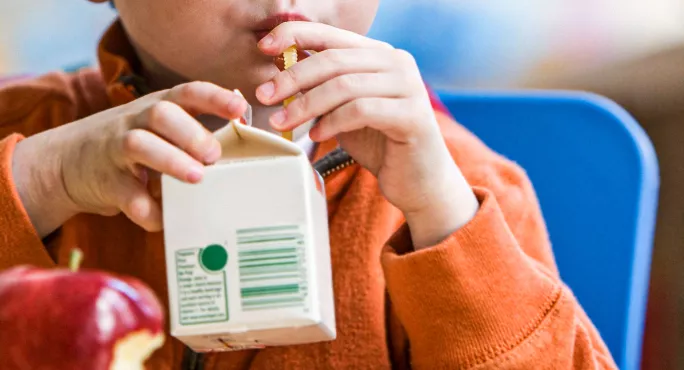Why the free school meals system is broken - and how to fix it

At Brambles Primary Academy in Middlesbrough, 67 per cent of children receive free school meals (FSM).
That’s significantly higher than the 24.6 per cent of schoolchildren who are eligible for FSM in England - and more than double the 31.2 per cent average for the North East, which has the highest rate in the country.
But that 67 per cent still doesn’t properly represent the real deprivation in the school, says Brambles’ acting headteacher Stuart Mayle.
“Our most recent IDACI” - the Income Deprivation Affecting Children Index - “put 97 per cent of our children in the top 10 per cent most deprived nationally,” he tells Tes.
Yet, almost a third of that 97 per cent aren’t FSM eligible. So Mayle and his team rely on charities to provide food “for families who are really struggling” but are ineligible for FSM. “At times, we’ve used our budget to purchase ham and bread for sandwiches,” he adds.
It’s a similar story at Dixons Academies Trust, where at schools in Liverpool, Manchester, Bradford and Leeds, there is an FSM take-up of over 50 per cent - but there are many more living in poverty missing out, says trust assistant principal James Lauder. “Schools often partner with food banks or community fridges” to help these families, he says.
Lauder tells Tes this demonstrates that while the “[FSM] system is great in theory”, it is not working as required: “We shouldn’t be in this situation.”
These examples are indicative of a far wider trend of the FSM system simply not supporting the children it should: Child Poverty Action Group (CPAG) estimates a third of school-age children who live in poverty are ineligible for FSM, while the Covid Social Mobility and Opportunities Study found 57 per cent of families suffering from food poverty are ineligible.
How did we get here - and will the new government do anything to fix it?
A responsibility to feed children
Free school meals have existed in England since 1906, when the government began providing lunches to malnourished children, and throughout the 20th century, various schemes allowed the poorest students to receive free lunches.
More recently, David Laws, former Liberal Democrat MP and schools minister between 2012 and 2015, pushed to make universal FSM a reality. “If children are in school for seven hours a day, the state has a responsibility to feed them while they are there,” he tells Tes.
As such, as part of the coalition government in 2013, Laws led a policy to introduce FSM for all primary pupils, irrespective of parental earnings.
However, he recalls, “we didn’t have enough finance to be able to deliver universal free school meals, even in the primary phase” so the policy was revised to cover infant-aged children only.
The policy came into effect in September 2014, serving 1.89 million infant children, with pupils at primary and secondary schools only eligible if their parents were in receipt of a qualifying benefit.
But in 2018 a new threshold was introduced, which the Department for Education claimed would “enable a greater number of children to benefit from free school meals” during the rollout of universal credit (UC), which was replacing a range of existing means-tested benefits.
What this meant, in reality, was that families in receipt of UC also had to have an annual household income of less than £7,400 to be eligible for FSM.
This threshold has not changed since and is one of the key reasons so many children are missing out - something Carl Cullinane, director of research and policy at the Sutton Trust, says is “concerning in the context of huge inflation in the last couple of years”.
Jude Hillary, co-head of UK policy and practice at the National Foundation For Educational Research (NFER), says it is an odd situation given that many other benefit thresholds usually rise with inflation: “The FSM threshold has stayed stubbornly low.”
Liz Todd, director of the Institute for Social Science at Newcastle University, goes one further: “It’s so obscenely low [that] it doesn’t make sense anymore”.
What’s more, as well as many children being ineligible despite their circumstances, there are many children who are eligible but not in receipt of free lunches because parents must actively register for FSM - but many don’t.

“We estimate that 200,000-250,000 families don’t register,” says Maria Bryant, professor of public health nutrition at the University of York. “They don’t get the free school meals because they don’t put in the application form.”
Lauder at Dixons says they see this issue first-hand, as while schools try to be “massively proactive” in encouraging parents to register, many still don’t: “We want our families to get support so we’ll try and sign people up, but at the end of the day we can only do so much.”
The regional lottery
In some parts of the country, this issue has been entirely removed - though not without controversy. In September 2023, mayor of London Sadiq Khan funded FSM for all primary children in state schools in the capital. This policy will continue in the academic year 2024-25.
Critics argue that providing FSM to students irrespective of their family’s financial status is a waste of resources, particularly when schools’ budgets are so stretched.
Lee Elliot Major, professor of social mobility at the University of Exeter, says the London scheme is a step towards a universal policy many would like to see - but admits it has created a situation where a child in poverty 100 yards from the boundary “will not get free meals” while others in London from a wealthy family will.
Greta Defeyter, professor of developmental psychology at Northumbria University, notes this disparity is even starker at a national level: “The North East has had the steepest increase in poverty rates,” she says, so having a universal policy for London but not elsewhere “is nonsense”.
Much of the concern with children missing out is social and educational, as Stephanie Slater, founder and chief executive of the charity School Food Matters, outlines: “It’s important children are well nourished, so they’re able to concentrate.”
But there are wider policy concerns, too. FSM is also used “as a proxy to tackle socio-economic disadvantage”, says Hillary at the NFER, who explains that FSM figures contribute to the pupil premium funding schools receive and are used to measure the attainment gap between disadvantaged pupils and their peers: “It’s a way of holding the government to account.”
But with so many children missing out, and others being included who don’t need to be, it is becoming a far harder metric to track.
Furthermore, changes to protectional measures implemented during the UC rollout have made things even worse, says Dave Thomson, chief statistician at FFT Education Datalab. “Since 2018, anybody who becomes eligible for FSM has remained eligible, even if their family circumstances change,” he says.
The result is “awful”, he says, “because we have no real idea which are the most disadvantaged kids in our schools”.
This - combined with the fact that simultaneously, some children living in poverty are ineligible - makes the current FSM measure “really problematic”, says Tammy Campbell, director for early years, equalities and wellbeing at the Education Policy Institute (EPI).
“We’ve got kids who are pretty disadvantaged and from very low-income families but they haven’t become FSM eligible [and] we’ve got a weird mix of kids who are eligible - it’s not helpful.”
The case for universal FSM
So how can we get the system to work better for all?
One obvious option cited by many would be to increase the £7,400 threshold. For example, if raised in line with inflation, it would be £9,366.50 today.
But experts Tes spoke to believe even more needs to be done.
Daniel Kebede, general secretary of the NEU teaching union, which runs the campaign Free School Meals For All, believes FSM should be universal at the primary phase across the country, as it is in London, and argues it would save more than it costs.
“Child poverty costs the Treasury over £39 billion per year,” Kebede says, adding that extending universal FSM to all primary children would cost an extra £0.88bn a year. “It’s a low-cost commitment that would make a material impact on lives.”
Indeed, a cost-benefit analysis by PwC found that for every £1 spent on a universal rollout (for children of all ages), £1.71 would be generated for the economy.
Meanwhile, the Liberal Democrats committed to a policy of universal primary FSM in their 2024 election manifesto - and its education spokesperson Munira Wilson says the party will continue to fight for this.
“Liberal Democrats will campaign for free school meals to be extended to the 900,000 children currently living in poverty [as per CPAG figures], and to all primary school children when public finances stabilise,” she tells Tes.
It’s a bold pledge and not without precedent: from September, all primary children in Wales will receive FSM, a move “welcomed” by Eithne Hughes, director of the Association of School and College Leaders Cymru.
However, Hughes tells Tes that while the Welsh government has funded this, it “needs to monitor the rollout and ensure schools are adequately supported”, because “some schools will now be catering for many more pupils and there are hidden costs to this, such as food waste disposal”.
Meanwhile, in Scotland, children in the first five years of primary - two years longer than in England - receive FSM no matter their family income. While there were plans for the government to roll this out to the final two years of the primary phases, too, these have now been scrapped, showing how complicated agreeing on an FSM provision can be.
But is universal FSM necessarily the best option?
Cullinane at the Sutton Trust argues that while universal FSM removes the “stigma” that puts some families off applying, it would “mean subsidising meals for a chunk of the school population who can afford them” - echoing criticisms of the London plan.
Given the economic situation the Labour government has inherited, the Sutton Trust instead argues for FSM for all children on UC, at both primary and secondary school, without an additional earnings threshold. “We feel that is a better prioritisation of limited funding,” Cullinane says.
Liz Todd at Newcastle University agrees prioritising UC claimants would be a “no-brainer”.
But not all families who are eligible for UC claim it, meaning that even if it was linked to FSM, children could still miss out, as Iain Porter, senior policy adviser at the Joseph Rowntree Foundation, outlines.
“Not all families who are eligible claim universal credit for a variety of reasons, including stigma, not being aware that they’re eligible, complex application processes and a lack of support to navigate them,” he says.
However, he said the idea of linking UC to FSM would “mean more children on the lowest incomes can access this vital support” and so the government needs to do “everything it can to make sure people are getting what they’re eligible for”.
The problem with funding
Even if eligibility is fixed, others say the government must also address per-meal funding.
Currently, it funds £2.53 for infants and £2.58 for older students on FSM - a rate Kay Salter, catering manager at Consilium Academies, a trust with schools across the North of England, says “is well below what it needs to be”.
She explains that in recent years she has seen increases in the cost of food, energy and wages, while the pressure for meals to meet nutritional standards has also risen.

“It is hard to create a nutritionally balanced meal when you don’t have the funding,” she says. “All caterers right now are scraping the barrel to try and get our meals out.”
Had the original £2.30 per meal rate set in 2014 increased with inflation, infant FSM would today be funded at £3.08 a head.
Myles Bremner, founder of a school food policy consultancy and director of the government’s School Food Plan between 2013 and 2017, agrees the government should fund FSM at “at least £3 per meal” - something London is already doing.
Meanwhile, Lorna Nicoll, operational lead at Poverty Proofing, part of the charity Children North East, argues that rules around how any unused FSM money given to each pupil is ‘lost’ each day should be changed so it rolls over: “That money should be used for the children,” she says.
Another element that many say needs fixing is that families must actively apply for FSM - which, as noted, many do not for various reasons: “There are all sorts of barriers, including literacy and parents who have English as an additional language,” notes Campbell from the EPI.
This means that even if eligibility thresholds change, children would still lose out. Cullinane at the Sutton Trust says this is why “an automated process” - where eligible children would automatically be registered for FSM - “would make it more humane”.
Marc Rowland, the pupil premium advisor at Unity Schools Partnership, agrees this would not just help parents but schools, too: “Schools don’t need extra stuff to do,” he says.
The power of local authorities
Could the process be automated? It’s something some local authorities are already doing.
In 2016, Sarah Cavanagh and Annabel Hallam at Sheffield City Council started an “auto-award” process whereby the council takes data on housing benefit and council tax support claimants, limits it to households with school-age children, and then matches it to the council’s FSM record.
“We write to the families,” Hallam says, “explaining that they may be entitled, and we give them three weeks to object to us running the check on their behalf.”
Since 2016, this opt-out system has raised £3.9 million in additional pupil premium funding for Sheffield schools, with 3,389 more pupils now in receipt of FSM.
Cavanagh and Hallam have shared their method with many local authorities, including Lewisham in south-east London where the work of Pinaki Ghoshal, the borough’s director for children and young people, and his team has seen 570 additional children registered for FSM, resulting in £1.8 million in additional pupil premium funding since 2023.
“At a time when school budgets are really tight, that’s a win-win situation,” Ghoshal says.
Hallam says it is “completely technologically possible” for the government to do this for all authorities: “The central government already pre-identifies children for free early learning for two-year-olds,” she points out.
“Every local authority gets a list from the Department for Work and Pensions (DWP) saying, ‘These are the children whose parents meet the applicable benefits.’ There is no reason why they couldn’t pre-identify which children are entitled to FSM.”
Indeed, the government already matches parent and pupil data to understand how attainment varies with household income, which Campbell suggests could also be used for FSM.
However, Sam Freedman, senior fellow at the Institute for Government and senior adviser to the education charity Ark, tells Tes that while data sharing is possible, “both DWP and the Treasury are very cautious about linking data” because of the risk of leaks and “misuse”.
“There would be a real worry for a lot of people if the Home Office had access to benefits’ data, because they might be able to use that as part of immigration policy,” he explains.
“There are reasons to keep these things separate, so people feel able to interact with different bits of the system, rather than the whole thing.”
The task for Labour
Moving forward, how likely is the Labour government to prioritise free school meals?
“Poverty is clearly a big issue for [education secretary] Bridget Phillipson,” Freedman says. “She’s been put in charge of the poverty task force. And you’d think that disadvantage at school, and therefore FSM and the pupil premium, is going to be part of that work.”
But, he adds, it is far from the only element. “The two-child benefits cap is the single quickest and easiest thing you could do to reduce poverty, so that would be at the top of my list.”
The DfE declined to comment on the efficacy of the FSM system but did acknowledge that “as with all government programmes, we will keep our approach under continued review”, while also touting their plan for breakfast clubs in all schools so “children start the day ready to learn”.
Stephanie Slater of School Food Matters says it is “brilliant […] the Labour government is pro-breakfast”, but adds that focusing only on morning meals is missing “the bigger picture”.
Greta Defeyter at Northumbria University agrees. If the nutritional benefit of a good meal is to have both a societal and an educational impact, the system that feeds children in schools needs to be revisited: “Children don’t stop learning at midday.”

Keep reading for just £1 per month
You've reached your limit of free articles this month. Subscribe for £1 per month for three months and get:
- Unlimited access to all Tes magazine content
- Exclusive subscriber-only stories
- Award-winning email newsletters
topics in this article



